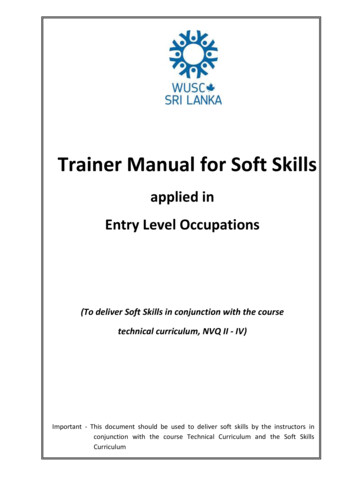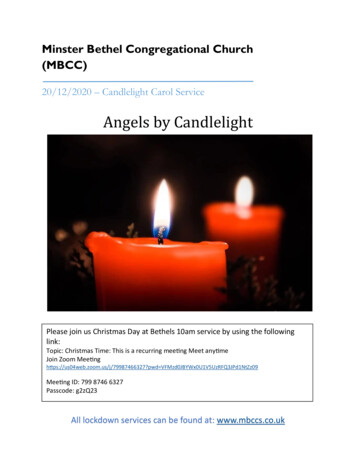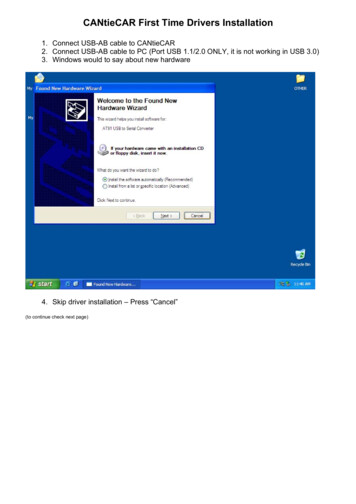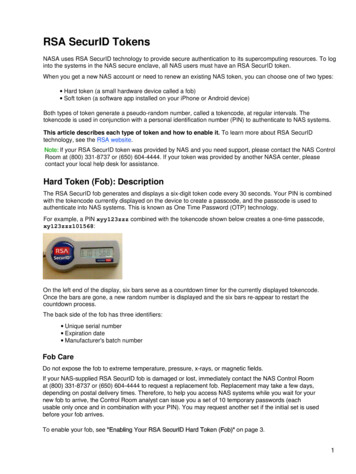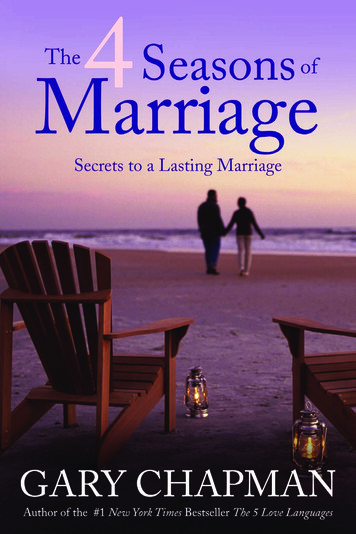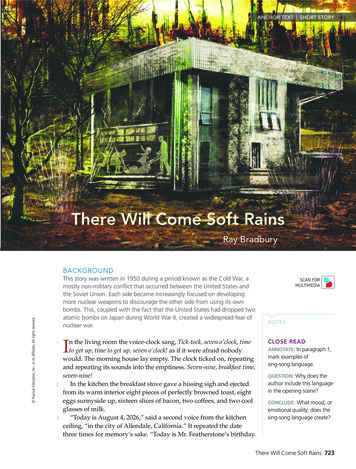
Transcription
ANCHOR TEXT SHORT STORYThere Will Come Soft RainsRay Bradbury Pearson Education, Inc., or its affiliates. All rights reserved.BACKGROUNDThis story was written in 1950 during a period known as the Cold War, amostly non-military conflict that occurred between the United States andthe Soviet Union. Each side became increasingly focused on developingmore nuclear weapons to discourage the other side from using its ownbombs. This, coupled with the fact that the United States had dropped twoatomic bombs on Japan during World War II, created a widespread fear ofnuclear war.123ISCAN FORMULTIMEDIANOTESn the living room the voice-clock sang, Tick-tock, seven o’clock, timeto get up, time to get up, seven o’clock! as if it were afraid nobodywould. The morning house lay empty. The clock ticked on, repeatingand repeating its sounds into the emptiness. Seven-nine, breakfast time,seven-nine!In the kitchen the breakfast stove gave a hissing sigh and ejectedfrom its warm interior eight pieces of perfectly browned toast, eighteggs sunnyside up, sixteen slices of bacon, two coffees, and two coolglasses of milk.“Today is August 4, 2026,” said a second voice from the kitchenceiling, “in the city of Allendale, California.” It repeated the datethree times for memory’s sake. “Today is Mr. Featherstone’s birthday.CLOSE READANNOTATE: In paragraph 1,mark examples ofsing-song language.QUESTION: Why does theauthor include this languagein the opening scene?CONCLUDE: What mood, oremotional quality, does thesing-song language create?There Will Come Soft Rains 723
45chimed (chymd) v. rang;made the sound of a bell67891011CLOSE READANNOTATE: Mark thewords in paragraphs 11and 12 that describe the“five spots of paint.”QUESTION: How do thesedescriptions differ from theearlier descriptions of thehouse?CONCLUDE: What ideadoes the author emphasizeby carefully selectingsensory language?724 UNIT 6 WORLD’S END121314Today is the anniversary of Tilita’s marriage. Insurance is payable, asare the water, gas, and light bills.”Somewhere in the walls, relays clicked, memory tapes glidedunder electric eyes.Eight-one, tick-tock, eight-one o’clock, off to school, off to work, run,run, eight-one! But no doors slammed, no carpets took the soft treadof rubber heels. It was raining outside. The weather box on thefront door sang quietly: “Rain, rain, go away; rubbers, raincoats fortoday . . .” And the rain tapped on the empty house, echoing.Outside, the garage chimed and lifted its door to reveal thewaiting car. After a long wait the door swung down again.At eight-thirty the eggs were shriveled and the toast was like stone.An aluminum wedge scraped them into the sink, where hot waterwhiled them down a metal throat which digested and flushed themaway to the distant sea. The dirty dishes were dropped into a hotwasher and emerged twinkling dry.Nine-fifteen, sang the clock, time to clean.Out of warrens in the wall, tiny robot mice darted. The rooms wereacrawl with the small cleaning animals, all rubber and metal. Theythudded against chairs, whirling their mustached runners, kneadingthe rug nap, sucking gently at hidden dust. Then, like mysteriousinvaders, they popped into their burrows. Their pink electric eyefaded. The house was clean.Ten o’clock. The sun came out from behind the rain. The housestood alone in a city of rubble and ashes. This was the one house leftstanding. At night the ruined city gave off a radioactive glow whichcould be seen for miles.Ten-fifteen. The garden sprinklers whirled up in golden founts,filling the soft morning air with scatterings of brightness. The waterpelted windowpanes, running down the charred west side where thehouse had been burned evenly free of its white paint. The entire westface of the house was black, save for five places. Here the silhouette1in paint of a man mowing a lawn. Here, as in a photograph, a womanbent to pick flowers. Still farther over, their images burned on woodin one titanic instant, a small boy, hands flung into the air; higher up,the image of a thrown ball, and opposite him a girl, hand raised tocatch a ball which never came down.The five spots of paint—the man, the woman, the children, theball—remained. The rest was a thin charcoaled layer.The gentle sprinkler rain filled the garden with falling light.Until this day, how well the house had kept its peace. Howcarefully it had inquired, “Who goes there? What’s the password?”and, getting no answer from the lonely foxes and whining cats, ithad shut up its windows and drawn shades in an old-maidenlypreoccupation with self-protection which bordered on a mechanicalparanoia.1. silhouette (sihl uh WEHT) n. outline of a figure, filled in with a solid color. Pearson Education, Inc., or its affiliates. All rights reserved.NOTES
15161718192021222324252627 Pearson Education, Inc., or its affiliates. All rights reserved.2829303132333435It quivered at each sound, the house did. If a sparrow brushed awindow, the shade snapped up. The bird, startled, flew off! No, noteven a bird must touch the house!The house was an altar with ten thousand attendants, big, small,servicing, attending, in choirs. But the gods had gone away, and theritual of the religion continued senselessly, uselessly.Twelve noon.A dog whined, shivering, on the front porch.The front door recognized the dog voice and opened. The dog,once huge and fleshy, but now gone to bone and covered with sores,moved in and through the house, tracking mud. Behind it whirredangry mice, angry at having to pick up mud, angry at inconvenience.For not a leaf fragment blew under the door but what the wallpanels flipped open and the copper scrap rats flashed swiftly out.The offending dust, hair, or paper, seized in miniature steel jaws,was raced back to the burrows. There, down tubes which fed into thecellar, it was dropped into the sighing vent of an incinerator whichsat like evil Baal2 in a dark corner.The dog ran upstairs, hysterically yelping to each door, at lastrealizing, as the house realized, that only silence was here.It sniffed the air and scratched the kitchen door. Behind the door,the stove was making pancakes which filled the house with a richbaked odor and the scent of maple syrup.The dog frothed at the mouth, lying at the door, sniffing, its eyesturned to fire. It ran wildly in circles, biting at its tail, spun in afrenzy, and died. It lay in the parlor for an hour.Two o‘clock, sang a voice.Delicately sensing decay at last, the regiments of mice hummedout as softly as blown gray leaves in an electrical wind.Two-fifteen.The dog was gone.In the cellar, the incinerator glowed suddenly and a whirl of sparksleaped up the chimney.Two thirty-five.Bridge tables sprouted from patio walls. Playing cards flutteredonto pads in a shower of pips. Glasses manifested on an oaken benchwith egg salad sandwiches. Music played.But the tables were silent and the cards untouched.At four o’clock the tables folded like great butterflies back throughthe paneled walls.Four-thirty.The nursery walls glowed.Animals took shape: yellow giraffes, blue lions, pink antelopes,lilac panthers cavorting in crystal substance. The walls were glass.They looked out upon color and fantasy. Hidden films clockedthough the well-oiled sprockets, and the walls lived. The nurseryNOTESattending (uh TEHND ihng)adj. being present; takingcare of thingsdelicately (DEHL uh kiht lee)adv. carefully; with graceand gentlenessfluttered (FLUH tuhrd) v.waved gently2. Baal (BAY uhl) ancient Near Eastern deity, later associated with evil.There Will Come Soft Rains 725
NOTES3637manipulated (muh NIHPyuh layt ihd) v. managed orcontrolled through clevermoves38394041424344floor was woven to resemble a crisp cereal meadow. Over this ranaluminum roaches and iron crickets, and in the hot still air butterfliesof delicate red tissue wavered among the sharp aroma of animalspoors!3 There was the sound like a great matted yellow hive of beeswithin a dark bellows, the lazy bumble of a purring lion. And therewas the patter of okapi4 feet and the murmur of a fresh jungle rain,like other hoofs falling upon the summer-starched grass. Now thewalls dissolved into distances of parched weed, mile on mile, andwarm endless sky. The animals drew away into thorn brakes andwater holes.It was the children’s hour.Five o’clock. The bath filled with clear hot water.Six, seven, eight o’clock. The dinner dishes manipulated like magictricks, and in the study a click. In the metal stand opposite the heartha fire now blazed up warmly.Nine o’clock. The beds warmed their hidden circuits, for nightswere cool here.Nine-five. A voice spoke from the study ceiling:“Mrs. McClellan, which poem would you like this evening?”The house was silent.The voice said at last, “Since you express no preference, I shallselect a poem at random.” Quiet music rose to back the voice. “SaraTeasdale. As I recall, your favorite . . .There will come soft rains and the smell of the ground,And swallows circling with their shimmering sound;And frogs in the pools singing at night,And wild plum trees in tremulous white;tremulous (TREHM yuh luhs)adj. trembling; quivering;timid; fearfulRobins will wear their feathery fire,Whistling their whims on a low fence-wire;Not one would mind, neither bird nor tree,If mankind perished utterly;And Spring herself, when she woke at dawnWould scarcely know that we were gone.”45The fire burned on the stone hearth. The empty chairs faced eachother between the silent walls, and the music played.46At ten o’clock the house began to die.The wind blew. A falling tree bough crashed through the kitchenwindow. Cleaning solvent, bottled, shattered over the stove. Theroom was ablaze in an instant!“Fire!” screamed a voice. The house lights flashed, water pumpsshot water from the ceilings. But the solvent spread on the linoleum,47483. spoors (spurz) n. droppings of wild animals.4. okapi (oh KAH pee) n. African animal related to the giraffe but with a much shorter neck.726 UNIT 6 WORLD’S END Pearson Education, Inc., or its affiliates. All rights reserved.And not one will know of the war, not oneWill care at last when it is done.
49 Pearson Education, Inc., or its affiliates. All rights reserved.505152535455licking, eating, under the kitchen door, while the voices took it up inchorus: “Fire, fire, fire!”The house tried to save itself. Doors sprang tightly shut, but thewindows were broken by the heat and the wind blew and suckedupon the fire.The house gave ground as the fire in ten billion angry sparksmoved with flaming ease from room to room and then up the stairs.While scurrying water rats squeaked from the walls, pistoled theirwater, and ran for more. And the wall sprays let down showers ofmechanical rain.But too late. Somewhere, sighing, a pump shrugged to a stop. Thequenching rain ceased. The reserve water supply which filled thebaths and washed the dishes for many quiet days was gone.The fire crackled up the stairs. It fed upon Picassos and Matisses5in the upper halls, like delicacies, baking off the oily flesh, tenderlycrisping the canvases into black shavings.Now the fire lay in beds, stood in windows, changed the colors ofdrapes!And then, reinforcements.From attic trapdoors, blind robot faces peered down with faucetmouths gushing green chemical.NOTES5. Picassos (pih KAH sohz) and Matisses (mah TEES ihz) paintings by the celebratedmodern painters Pablo Picasso (1881–1973) and Henri Matisse (1869–1954).There Will Come Soft Rains 727
57585960CLOSE READANNOTATE: Inparagraphs 61 and 63,mark words and phrasesthat relate to extrememental states.61QUESTION: What dothese words show aboutthe process the house isundergoing?CONCLUDE: What is theeffect of the author’schoice to portray the housein this way?626364656667728 UNIT 6 WORLD’S ENDThe fire backed off, as even an elephant must at the sight of a deadsnake. Now there were twenty snakes whipping over the floor, killingthe fire with a clear cold venom of green froth.But the fire was clever. It had sent flames outside the house, upthrough the attic to the pumps there. An explosion! The attic brainwhich directed the pumps was shattered into bronze shrapnel onthe beams.The fire rushed back into every closet and felt of the clothes thathung there.The house shuddered, oak bone on bone, its bared skeletoncringing from the heat, its wire, its nerves revealed as if a surgeonhad torn the skin off to let the red veins and capillaries quiver in thescalded air. Help, help! Fire! Run, run! Heat snapped mirrors like thefirst brittle winter ice. And the voices wailed Fire, fire, run, run, like atragic nursery rhyme, a dozen voices, high, low, like children dying ina forest, alone, alone. And the voices fading as the wires popped theirsheathings like hot chestnuts. One, two, three, four, five voices died.In the nursery the jungle burned. Blue lions roared, purple giraffesbounded off. The panthers ran in circles, changing color, and tenmillion animals, running before the fire, vanished off toward a distantsteaming river . . .Ten more voices died. In the last instant under the fire avalanche,other choruses, oblivious, could be heard announcing the time,playing music, cutting the lawn by remote-control mower, or settingan umbrella frantically out and in the slamming and opening frontdoor, a thousand things happening, like a clock shop when eachclock strikes the hour insanely before or after the other, a scene ofmaniac confusion, yet unity; singing, screaming, a few last cleaningmice darting bravely out to carry the horrid ashes away! And onevoice, with sublime disregard for the situation, read poetry aloud allin the fiery study, until all the film spools burned, until all the wireswithered and the circuits cracked.The fire burst the house and let it slam flat down, puffing out skirtsof spark and smoke.In the kitchen, an instant before the rain of fire and timber, thestove could be seen making breakfasts at a psychopathic rate, tendozen eggs, six loaves of toast, twenty dozen bacon strips, which,eaten by fire, started the stove working again, hysterically hissing!The crash. The attic smashing into the kitchen and parlor. Theparlor into cellar, cellar into subcellar. Deep freeze, armchair, filmtapes, circuits, beds, and all like skeletons thrown in a clutteredmound deep under.Smoke and silence. A great quantity of smoke.Dawn showed faintly in the east. Among the ruins, one wall stoodalone. Within the wall, a last voice said, over and over again andagain, even as the sun rose to shine upon the heaped rubble andsteam:“Today is August 5, 2026, today is August 5, 2026, today is . . .” Pearson Education, Inc., or its affiliates. All rights reserved.56NOTES
Comprehension CheckComplete the following items after you finish your first read.1. What is the daily routine of the automated house?2. What has happened to the rest of the houses in the neighborhood?3. What are the five spots of paint on the exterior of the house?4. By the end of the story, what happens to the house?5.Notebook Create a storyboard that summarizes the sequence of events in “ThereWill Come Soft Rains.” Pearson Education, Inc., or its affiliates. All rights reserved.RESEARCHResearch to Clarify Choose at least one unfamiliar detail from the text. Brieflyresearch that detail. In what way does the information you learned shed light on anaspect of the story?Research to Explore Bradbury published this story in 1950. Conduct research aboutmodern “smart houses” to find out which of the technologies he described exist today.Share your findings with the class.There Will Come Soft Rains 729
MAKING MEANINGClose Read the TextTHERE WILL COME SOFT RAINS1. This model, from paragraph 5 of the text, shows two sampleannotations, along with questions and conclusions. Closeread the passage, and find another detail to annotate.Then, write a question and your conclusion.ANNOTATE: This unusually exact time isrepeated in rapid succession.QUESTION: What effect does the rapidrepetition of “eight-one” create?CONCLUDE: It suggests a relentlesstechnology that may be unnecessarily preciseand does not allow for flexibility.Eight-one, tick-tock, eight-one o’clock, off toschool, off to work, run, run, eight-one! Butno doors slammed, no carpets took thesoft tread of rubber heels. It was rainingoutside. The weather box on the frontdoor sang quietly: “Rain, rain, go away;rubbers, raincoats for today . . .”QUESTION: Whydoes the authorinclude these lines?CONCLUDE:The house’stechnology treatedall inhabitants,including theadults, likechildren.2. For more practice, go back into the text, and complete the close-readnotes.3. Revisit a section of the text you found important during your first read. Readthis section closely, and annotate what you notice. Ask yourself questionssuch as “Why did the author make this choice?” What can you conclude?Analyze the TextCITE TEXTUAL EVIDENCEto support your answers.Notebook Respond to these questions. STANDARDSRL.9–10.4 Determine the meaningof words and phrases as they areused in the text, including figurativeand connotative meanings; analyzethe cumulative impact of specificword choices on meaning and tone.RL.9–10.5 Analyze how an author’schoices concerning how to structurea text, order events within it, andmanipulate time create such effectsas mystery, tension, or surprise.L.9–10.5 Demonstrateunderstanding of figurative language,word relationships, and nuances inword meanings.730 UNIT 6 WORLD’S END1. (a) Analyze What tone, or attitude, does the automated voice use toaddress the missing inhabitants? (b) Draw Conclusions What idea abouttechnology does this tone suggest?2. Reread paragraph 16. (a) Interpret Who are the “gods” that have goneaway? (b) Contrast What contrast does this passage set up between thehouse’s behavior and the new reality?3. (a) Summarize In paragraphs 40–42, what personal information is givenabout one of the house’s former inhabitants? (b) Hypothesize Why doesthe author wait until this point in the story to provide specific informationabout one of the people who lived in the house?4. Evaluate Reread the poem in paragraph 44. Is the story a “retelling” ofthe poem? Explain.5. Essential Question: Why do we try to imagine the future? Whathave you learned about people’s attempts to imagine the future fromreading this story? Pearson Education, Inc., or its affiliates. All rights reserved.Tool KitClose-Read Guide andModel AnnotationANNOTATE: Thesesing-song rhymesare childish.
house had been burned evenly free of its white paint. The entire west face of the house was black, save for five places. Here the silhouette1 in paint of a man mowing a lawn. Here, as in a photograph, a woman bent to pick flowers. Still farther over, their images burned on wood in one t
